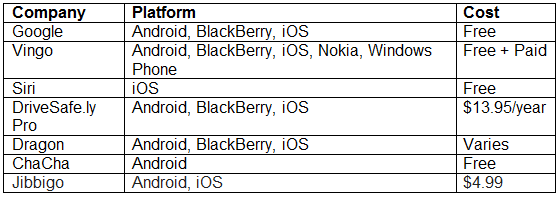Put simply, voice search is a means of searching for something online by saying the words out loud, rather than typing the query manually.
How voice search started
The concept stems from voice recognition technology allowing users to perform this new type of search. Smartphones and other web-enabled mobile devices have become the main driving force behind voice search.
Top voice search applications
Why voice search is important
1. Improved accuracy. Voice search is getting more and more accurate. Not too long ago, voice recognition simply wasn’t accurate enough to become a reliable tool. In many cases, it was more frustrating than helpful. According to the KPCB Internet Trends 2016 report, the accuracy rate of voice search is now up to 92 percent. Due to this development, voice search capabilities will expand and it looks set to become more and more important for businesses to embrace.
2. Voice search enabled devices are becoming more common. New devices (like Alexa and Google Home) are bringing voice search to the everyday consumer — and are introducing it into the heart of your home (Amazon Echo).
The popularity of voice search
There is no doubt that voice search is here to stay. Online marketing experts understand that voice search really matters now. They must take action to adapt their online business to make sure it continues to grow alongside this exciting new technology.
According to this BrightLocal study in 2018:
* 58% of consumers have used voice search to find local business information within the last year
* 46% of voice search users look for a local business daily
* 27% visit the website of a local business after conducting a voice search
* 76% of smart home speaker users conduct local searches at least once a week, with 53% performing daily searches.
According to this 2014 study from Northstar Research:
* In October 2014, 55% of US teens and 41% of US adults used Google voice search more than once a day and the use of mobile voice search more than doubled between 2013 and 2014
* 56% of adults said that they use voice search because it makes them feel ‘tech-savvy.’
According to Camscore:
50% of all online searches will be accomplished by voice search in 2020.
According to Gartner:
* By 2020, 30% of all searches will be carried out without using a screen.
According to Google:
* Google stated in 2016 that 20% of all searches are currently voice related. This has also been backed up by Google’ search statistics regarding voice, which is continuing to entice and inspire successful Internet marketers.
Voice search user predictions
* By the year 2020, Activate predicts that 21.4 hands-free devices will be in our homes.
* In 2017, Voicelabs claimed that 33 million devices with voice search capabilities would be in circulation across the US by the end of the year. They missed the mark by 12 million. In the final quarter of 2017, 18 million smart speaker devices were shipped out to the US market, bringing the overall circulation to 45 million devices.
* There are more than 20 million new hands-free device activations on the horizon, which is prompting online companies to take a serious look at where their businesses are going to fit in.
All these current voice search stats and predictions of its ongoing popularity and growth require marketers to realise the huge importance of this new medium ASAP and to take the necessary actions to keep track with it now.
If your business is not prepared for this massive change within home assistant technology, you will suffer the consequences.
Some businesses will inevitably have to prepare more than others, however. In the next instalment of this article, we will talk about which types of business will be impacted more than others by this phenomenon, and what they can do to prepare.


